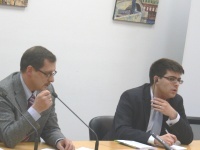Registration
You will receive an email confirming your registration.
IMGXYZ3118IMGZYXStrategic arms control negotiations—always a vital aspect of Russian-American relations—have experienced both difficulties and breakthroughs in the last few decades. Just as overall relations between the United States and Russia have improved in recent years, progress has also been made on arms control—the New START treaty, the latest agreement, was implemented earlier this year. At an event hosted by Carnegie Moscow Center, James Acton, senior associate in Carnegie’s Nuclear Policy Program, discussed the challenges and opportunities for the next round of talks. Carnegie’s Alexei Arbatov moderated.
The Effect of Deep Reductions
- Asymmetric goals: Acton began by remarking that the Unites States is primarily interested in curtailing Russian nuclear capabilities, while Russia is primarily interested in curtailing U.S. non-nuclear capabilities. While not new, this asymmetry has reached unprecedented levels, which is likely to make the next round of talks the most challenging yet.
- Factors other than size: Acton further noted that both countries are concerned with how deep reductions in arsenals will affect their strategic stability. All else being equal, large nuclear forces are more likely than small forces to survive an attack, but Acton argued that arsenal size is not the only important factor. The concentration of reentry vehicles on intercontinental ballistic missiles (ICBMs), the existence of ballistic missile defense systems (BMD), and other elements are more critical to ensuring a nuclear force’s survivability, he added. Indeed, as the lack of BMDs and conventional Prompt Global Strike (PGS) capability can undermine strategic stability, despite the presence of relatively large nuclear forces. If these factors are effectively managed, then low numbers of nuclear warheads could produce a stable outcome, he concluded.
Dealing with Domestic Political Fluctuations
- The intervention of domestic politics: Domestic political changes, especially in the United States, could pose a challenge to BMD cooperation, said Acton. For cooperation to succeed, both countries must follow a long-term course that is able to resist cyclical political changes and domestic opposition to cooperation.
- Finding a solution: To mitigate this challenge, concrete security benefits from cooperation must be realized. As an example, Acton mentioned a possible joint BMD system to respond to threats from Iran and North Korea, which would be more effective than one created solely by the United States or NATO. It could act as a strong incentive for future U.S. administrations, irrespective of political party, not to jeopardize cooperation. A cooperative relationship that enhances mutual security would go a long way toward creating a consensus in the United States to develop BMDs in a way that could placate potential Russian objections, Acton argued.
The Problem of Prompt Global Strike
The Department of Defense’s PGS mission has emerged as an issue of contention in negotiations.
- Shift in focus: According to a new White House report, the United States will not develop unguided ballistic missiles with conventional warheads—a system that is accountable under the New START agreement. Instead, it will focus on developing “boost glide systems,” which are launched by ballistic missiles but glide in the atmosphere for the majority of their flight. As these weapons are not flying in ballistic trajectories, the United States claims they are not affected by the New START agreement. Acton said he believes these systems are still at least a decade away from being deployed, and therefore will not be introduced during the lifetime of New START.
- Future scale still unclear: According to Acton, the extent to which PGS will be introduced is unclear, although the prospects for its extension have important implications for arms control. If PGS systems are deployed in large numbers, then the United States is unlikely to include them in a future arms control agreement.
- Russian response: Acton noted that Russia has taken steps to mitigate U.S. BMD and PGS systems, including providing funding for the research and development of a new, liquid-fueled, heavy silo-based ICBM, which could hurt strategic stability between Russia and the United States.
What’s Next?
Negotiators will face a tremendous list of challenges in the next round of arms control talks. Acton offered some ideas about how best to deal with them:
- Legally binding treaty: The United States and Russia should make a legally binding treaty the main goal of the next round of talks, Acton said. During the long process of negotiations, however, both sides should agree to develop informal confidence-building measures, which should be useful in their own right and enhance prospects for an eventual legally binding treaty.
- Tactical nuclear weapons: Acton suggested that a good first step might be the verification of the results of the 1991/92 presidential nuclear initiatives. As a result of these initiatives, both the United States and Russia claimed to move tactical nuclear weapons to storage. Acton proposed that both sides could share their respective storage locations and begin a reciprocal process to verify that no tactical weapons exist at forward bases. While not a complete solution to the problem of tactical nuclear weapons, it would be a good first step in the right direction, he said.
- Increased data exchange: Russia has expressed concern about U.S. conventional strategic weapons (i.e., cruise missiles). Some Russian experts believe that cruise missiles could destroy or disable silo-based ICBMs, whereas American experts generally dismiss these fears. Acton mentioned that a confidential joint threat assessment might reduce this discrepancy.
